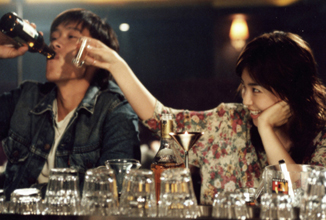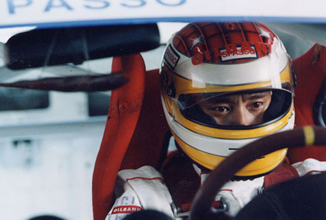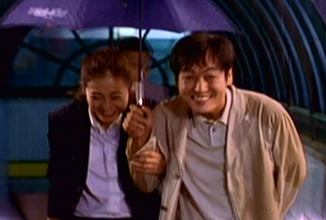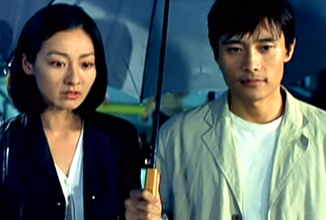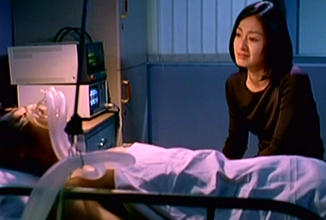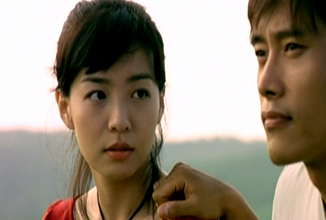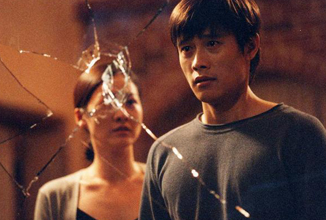
 |
||||||||||
Can love be eternal, surviving lies, betrayal and
even death? Quite a heavy question that forms the basis for the 2002
South Korean film "Addicted" (original Korean title "Jungdok" –
literally "The Poisoning"). The story centres around four main
characters: Ho-jin (Lee Eol), his wife Eun-su (Lee Mi-yeon), his
brother Dae-jin (Lee Byeong-heon) and the girl who is unrequitedly
in love with Dae-jin - Ye-jin (Park Seon-yeong):
Dae-jin, on the other hand, couldn't be more
different from his brother. As already stated he lives with Ho-jin
and Eun-su, has no real career and spends most of his time fixing up
and racing sports cars. He has no girlfriend but whenever the
subject of relationships is brought up (mostly by Eun-su) he says
that he is happy with his life the way it is and prefers the freedom
of car racing to being involved with any girl, even though he is
aware that Ye-jin is in love with him. From the very beginning of
the film it is clear that even though Eun-su cares deeply for her
brother-in-law she would really like to see him grow up, sort his
life out and start dating Ye-jin and it is impossible not to read
between the lines to realize that she wants her home to be just for
her and her husband.
The status quo remains undisturbed for only a short time before the brothers are involved in separate car accidents at the same time on the same day. Ho-jin crashes his car on the way to see his brother in a race and Dae-jin crashes during that race. Both are rushed to hospital where Ho-jin, showing no brain activity, is placed on a life-support machine. Dae-jin, though badly injured, wakes and immediately starts to act somewhat out of character. On returning home he begins to exhibit behaviour similar to that of Ho-jin - he takes an interest in furniture making, ignores his racing cars etc. - and seems to have intimate knowledge of personal matters previously only shared between Ho-jin and Eun-su. Unnerved by his actions Eun-su confronts Dae-jin who tells her that he is actually Ho-jin - his spirit now trapped in Dae-jin's body. The perspective from which we view the movie moves to Eun-su from this point on and we, like her, have to try to unravel the perplexing, seemingly outlandish and, from Eun-Su's point of view, hurtful claims of her brother-in-law. If Ho-jin's spirit really is in the body of Dae-jin will her love for him remain and if Dae-jin is actually still himself why is he so adamant that he isn't?
Addicted is not a
comfortable film to watch but it is also impossible to turn away.
The pain that Dae-jin's assertions cause not only Eun-su but also
Ye-jin and Dae-jin himself is shown in excruciating detail. The film
moves slowly, like many South Korean stories of love and heartbreak,
resulting in the possible reasons for Dae-jin's claims constantly
changing in their likelihood. Regardless of what the outcome of the
story is, and even though that outcome will have entered viewers'
heads several times, when it actually comes it is still an utter
revelation.
Direction: Director Park Young-hoon uses the mirroring of
scenes to great effect in Addicted. "Snapshots" of a happy Ho-jin
and Eun-su take on a more melancholy, and somewhat uneasy, flavour
when almost identically repeated in scenes between Dae-jin and
Eun-su (such as the scenes of Eun-su sheltering from the rain under
an umbrella with each of them successively- screencapped earlier in
this review). Intimate camera shots that initially illicit warmth
and comfort, while Ho-jin and Eun-su are together, become
claustrophobic following the accidents leaving viewers with the
feeling of being boxed in with nowhere to turn - exactly the way
each of our characters feels in succession. Park Young-hoon also
manages to pick every facial nuance from the actors in scenes where
non-verbal communication is paramount, without ever making it seem
contrived.
Park Young-hoon has created a powerful and thought provoking film which deals with the intricacy of relationships, of how love and trust are inextricably linked and the tangled web that can often result. Each of the characters becomes an unwilling victim of the love that they choose and each has to question whether it is better to pay the high price which that love requires or settle for something less than perfect simply to get some peace of mind. Addicted deserves its place among the best of South Korean cinema's New Wave. If you see it with someone else be prepared for a discussion when the credits roll, if you see it alone prepare for some thinking. Either way, just see it.
DVD DVD Features: Extras: o Making Of
Featurette |
||||||||||
All images © Tai Seng Entertainment Review © P. Quinn |
||||||||||


